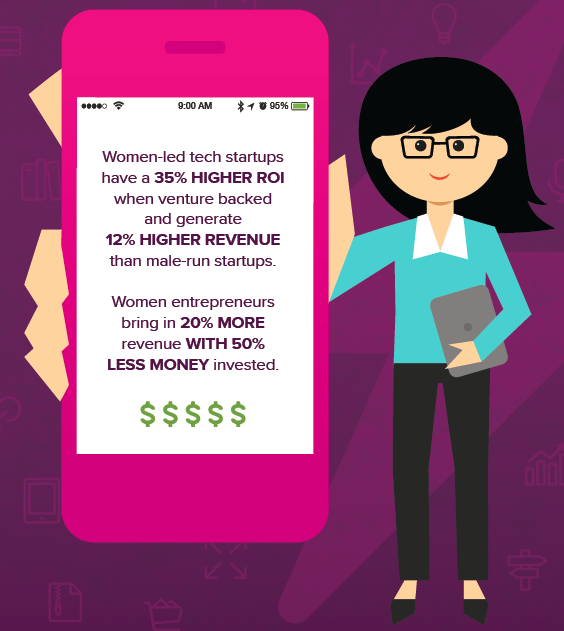10 Women in Tech Creating Real Change in 2016
 Hey, I've been working some within the women in tech community, supporting women-led startups and code programs for women and girls. Lots of times, the folks in this community don't get the recognition they deserve. My team and I compiled a list of some women who are real changemakers in the tech space, but this is a list that could be much longer...
Hey, I've been working some within the women in tech community, supporting women-led startups and code programs for women and girls. Lots of times, the folks in this community don't get the recognition they deserve. My team and I compiled a list of some women who are real changemakers in the tech space, but this is a list that could be much longer...
1. Yoky Matsuoka, Vice President of Technology at Nest and Founder/President of YokyWorks
Follow @yokymatsuoka
Matsuoka is in charge of the user interface and self-learning aspects of Nest's thermostat. Nest is one of the Valley's most watched tech companies, and was bought by Google for $3.2 billion. Nest is now buying hot startups of its own; it acquired Dropcam for $555 million.
Beyond Nest, Matsuoka is known for her work on robotics and neuroscience, working on more realistic prosthetics. She founded YokyWorks which provides engineering solutions for the gap between research and available products to enhance life experience for those with physical disabilities. Formerly, she was the Head of Innovation at Google and a professor of computer science and engineering at the University of Washington. In 2007, she received the MacArthur Genius Award.
2. Angie Byron, Software Developer / webchick
Follow @webchick
Angela Byron is a software developer best known for her work with Drupal, a free and open source content management system and content management framework. She has been named one of the most highly regarded contributors to the open source movement, and has worked to encourage people to become involved with open source, particularly women. Byron was the first woman to be featured on the cover of Linux Journal, in April 2011.
3. Aliya Rahman, Program Director at Code for Progress
Aliya Rahman leads the recruitment, in-residence training, and job placement of Code for Progress fellows into full-time developer positions. Her work is informed by a background in legislative, electoral, and community organizing for racial and economic justice campaigns, and by a former life in public higher education conducting curriculum research and teaching computer programming and educational foundations/policy.
Rahman has developed Django applications, conducted tech trainings, and performed data analysis. Now based in Washington, DC, she says she's "thoroughly enjoying life as a non-accidental techie, and is grateful to be part of an active ecosystem of women and people of color who believe tech has a pivotal role to play in creating social change."
4. Allyson Kapin, Founder of Women Who Tech
Follow @WomenWhoTech
Allyson Kapin was named One of the Most Influential Women in Tech by Fast Company and a Tech Titan by the Washingtonian. She founded Women Who Tech several years ago to champion more women in the tech field, and out of Women Who Tech, she started the Women Startup Challenge. (Disclaimer: I'm on the board of the Women Startup Challenge.) The Women Startup Challenge is an impressive effort to get more women-led startups showcased and funded, since only 7% of all investor money goes to women-led startups. So far, over 500 women-led startups have entered the Women Startup Challenge and 22 finalists have pitched their ventures to panels of investors and close to $400K has supported several of the startups. The next Women Startup Challenge will be a national Challenge this spring in San Francisco. Stay tuned to find out more.
5. Sue Black, Founder of Techmums and Bletchley Park Campaigner
Follow @Dr_Black
Sue Black founded Techmums, a social enterprise working to give mothers the confidence, skills, and understanding they need to ensure they're making the most of technology. It was through her own tech education that Sue was able to bring her family out of poverty, earn a decent living, and create a better future for them all. She knows first hand what a difference education and confidence with technology can make and now wants to give that opportunity to other families.
Black was recently appointed was a judge for the 2015 L’Oreal-Unesco for Women in Science Fellowship. She's also been widely acclaimed for her role in campaigning to save Bletchley Park, the home of the UK’s secret codebreakers in the Second World War. She founded BCSWomen in 2001, which now has more than 1,200 members.
6. Holly Liu, Cofounder and Chief of Staff at Kabam
Follow @hollyhliu
Holly Liu is co-founder and Chief of Staff of Kabam, one of the leaders in free-to-play core games. Liu also oversees Kabam’s corporate culture as head of People Operations (“People Ops”), which is responsible for driving Kabam’s vision, mission, and values for its more than 800 employees in offices worldwide. Liu's helped build a world-class human resources team that's responsible for recruiting and retaining top talent; she's grown Kabam’s personnel base by 500% in just 3 years.
Prior to her role as Chief of Staff at Kabam, Liu was VP of People Ops and Director of UX. She led the product design for Kabam’s award-winning Kingdoms of Camelot, which has grown into a $250M franchise in less than 4 years. Holly was also an initial designer for the mobile extension Kingdoms of Camelot: Battle for the North, which was the top grossing app on iOS in 2012.
About diversity, Liu said, "We have a lot of diverse perspectives and a lot of diverse experience on our game teams. I feel that richness has enabled us to recognize some of the shifts and react in a very different way. I believe that makes us stronger in the future."
7. Lea Verou, Computer Scientist and Developer/Designer
Follow @LeaVerou
Lea Verou describes herself as a computer scientist / web standards geek / front-end developer / web designer / speaker / author, originally from Greece. Verou is a Research Assistant at MIT CSAIL and an Invited Expert in the W3C CSS Working Group.
She's written a book on advanced CSS for O’Reilly, worked for W3C/MIT, has given 60+ invited talks around the world, released several open source projects, co-founded a Greek startup called Fresset Ltd (which she left in 2011), and many other things. While her background is technical, she has a strong passion for visual design, as well.
8. Elena Zannoni, Senior Director of Linux and Virtualization Engineering at Oracle
Follow @elena_zannoni
Oracle is a big player in the Linux world, supplying its customers with a version of the Linux operating system based on Red Hat's Linux. Zannoni is leading that team, which has made her highly visible not just at Oracle, but in the open-source world.
Zannoni came to Linux from years working on other open-source projects, starting at Cygnus Solutions bought by Red Hat and then hired away by Oracle. She's a regular Linux conference speaker and she volunteers to organize the Linux Plumbers Conference. She earned a doctorate in evolutionary computation computer science from Wayne State University.
She has a piece of advice for other women programmers: "I tried always to give my best without thinking too much about gender bias. One important thing is to not doubt oneself. There are plenty of other people that will undermine your confidence, no need for you to do it to yourself."
9. Avni Shah, Vice President of Product Management at Google
(Note: we could not find Shah's Twitter handle...)
Avini Shah heads up Chrome development at Google. She was one of two women to give presentations at Google's developer's conference I/O in 2014. This was notable because Google's been trying to up the profile of women in tech.
Shah showcased Chrome working with Google's newest version of Android, L. Shah's an MIT graduate who's been at Google since 2003 and previously worked on the Google Toolbar and Google Notebook
10. Reshma Saujani, Founder & CEO of Girls Who Code
Follow @reshmasaujani
Reshma Saujani is the Founder of Girls Who Code, a national nonprofit working to close the gender gap in technology and prepare young women for jobs of the future. Formerly, Saujani was the former Deputy Public Advocate of NYC. As Executive Director of the Fund for Public Advocacy, Saujani brought together public and private sectors to encourage entrepreneurship and civic engagement across NYC. Today, she's galvanized industry leaders to close the gender gap in STEM education and empower girls to pursue careers in technology and engineering.
In 2010, Saujani became the first South Asian woman to run for Congress, promoting smarter policies to spur innovation and job creation. Advocating for a new model of female leadership focused on risk-taking, competition and mentorship, Saujani's also the author of the book Women Who Don't Wait in Line.




